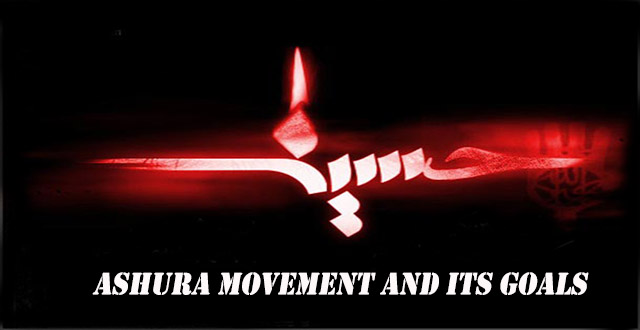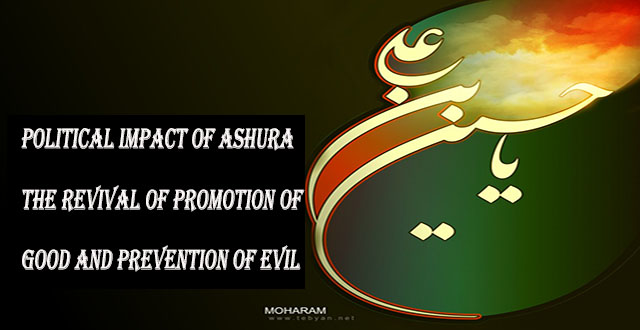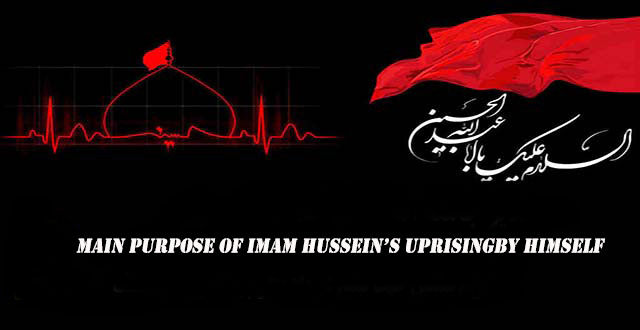
Following the issue of Imam Hussein’s (AS) knowledge of the fate and movement and some suspicions that one of the authors made in analyzing his movement and his knowledge about the fate of martyrdom and following the questions that were proposed by some clerics with Seyed Mohammad HosseinTabatabai, he wrote many thesis about Imam’s knowledge and published then. As Ayat- Allah Reza
Ostadi said in his collection, “twenty articles”, this thesis is so firm and strong. Although this author
criticized this article before, AllameTabatabai answered all the questions and mentioned them at the end of the thesis.
The first part of the article is about Imam’s knowledge, and it is available for more research.Allameh, thegreat deceased, analyzed this thesis under the title of “Seyed al-shohada’s movement and its aim”.
We can clarify this matter by a fast review of that day’s situation. The darkest and worst time for his family and shia people were the twenty-year period of Muawiyeh government.
When Muawiyeh obtained the kingdom of Islamic country, he tried to destroy the holy family of the prophet and he tried to improve his government. He tried as much as possible to encourage thepeople to forget those holy families.
He endeavored to attract a group of the prophet’s companions who were respected by the people. He fabricated some fake Hadith which was in favor of his companions and made them to distribute it around the Islamic countries. In those Hadith they cursed Imam Ali so much.
He had some human forces like Ziyad ibn Abieh, Samrat ibn Jondab,Basr ibn Arta and etc.who were responsible to kill those people who were eager to know about the prophet’s family and he threatened them so much.
In this environment the people hated Imam Ali and his family. Those people who had a kind of relationship with the prophet household tried to disconnect their relationship because of their fear of their lives.
In fact Imam Hussein’s leadership lasted about 10 years and all moments of this period was contemporary to Muawiyeh era. During this time that he was the leader, no Hadith was narrated, i.e. a kind of narration which is reported from that Imam by the people. It shows that in that time the people had a severe time. This hardship didn’t let Imam Hussein to fight against Muawiye and there was no use for it.because:
First: Muawiyahhad taken the oath of allegiance and despite the homage, no one accompanied him.
Second: Muawiyeh introduced himself as one of the great companions of the prophet. He chose a the title of “Muslim’s brother” for himself.
Third: he could kill Imam Hussein easily by his ruse and then take revenge on his killers. And he could hold a funeral for him as well!
Muawiyah make a situation for Imam Hassan that he had no security in his house and then when he wanted to take the allegiance, he poisoned that imam by his wife and killed him.Imam Hussein who moved immediately after Muawyie’s death and sacrificed his baby, couldn’t sacrifice in Muawyieh era because his martyrdom had no efficacy in that time.
It was a summary of bad situation that Muawiyah provided for the Islamic environment, and he made the prophet family to be useless.The last thing he bump into the body of Islam and Muslims was an endeavor to change the Islamic Caliphate to a hereditary absolutism. And replaced his son, Yazid, as the king. However Yazid had no religious character- even in the form of hypocrisy and pretension – he spent all his time to play with the monkeys and playing music and fun openly and he did not respect religious rules. When the prisoners of the prophet’s household and Karbala martyrs were brought to Damascus, he came out to watch them.
When they brought the heads of some prisonors for him he said a poetry:
لعبت هاشم بالملک فلا خبر جاء و لا وحی نزل
Yazid was governing under the policy of his father and it clarified some things about Islam and Muslims. In that situation the only thing that could destroy the prophet household was Imam Hussein’s oath of allegiance.
Imam and the allegiance with Yazid:
Following the real leadership of Imam Hussein, he couldn’t take the oath of allegiance to Yazi. Because it was a move toward destroying Islam and religion. There was no way other than rejecting the allegiance for him and it was that same thing that God asked him.
On the other hand rejecting the allegiance could provide a bad effect, because the severe and stubborn king of that time wanted to take the allegiance and it was necessary for him.
Imam Hussein preferred death rather than life in favor of Islam and Muslims and he ignored the allegiance. And it was the divine order. The prophet told him in the dream that: God wants to see your dead body. He told those people who reject him to govern: God wants to see me to be killed. It means a province legislation not a developmental one.A I mentioned before the developmental province had no effect on God’s will.
That’s right, Imam Hussein decided to be killed and the disasters in that time convey his opinion. The tragic circumstances of his death, confirmed the prophet’s family innocence and legitimacy. After the testimony, the bleeding and movements continued for twelve years. After that time the number of Shia people wereincreased and it was a firm confirmation for legitimacy with the prophet’s household innocence. The pioneer in this field was Imam Hussein. The comparison between these two eras ( before and after his martyrdom during 14 centuries) will emphasize on his opinion and this is the same as his poetry:و ما ان طبنا جبن و لکن منایانا و دولة آخرینا
Muawiyah advised to Yazid to abandon Hussein ibn Ali if he rejected the allegiance and do not complain against him. This advice was not because of sincerity and love, he knew that Hussein ibn Ali doesn’t take the oath of allegiance and if he is killed by Yazid, the prophet household will claim for their innocence. So it could be the best device for advertising between the Mulims and it was so bad for the Ummavy kingdom.
Imam and his duties:
Imam Hussein was familiar with his divine duty which was rejecting the allegiance. He was informed of the endless power of Yazid and BaniOmmayeh. He knew that his only way to do this divine duty is martyrdom. He mentioned this concept by different word in different situations. He said in the parliament of Medina king: those people who are similar to me do not take the oath of allegiance to Yazid.
That night when he was going out of Medina, he narrated some sayings of his grandfather: God asks you to be killed.
In the sermon that he was reading in the way of Mecca, he repeated the same things. It was an answer to one of the Arabian guys who tried to dissuade him to not to go to Kufa. Otherwise he would be killed. He said: it is so clear that they will kill me anywhere.
Some of those narrations are contradictory and there is no document to prove it. But it is a good reason to search more about it.
A different method within Imam’s uprising period:
When we say that our God’s will was his death, it doesn’t mean to stay motionless to being killed by Yazid to do his duty in this way and call it as a war.
Imam’s duty was to fight against Yazid’s government and to reject his allegiance and it terminates to martyrdom. It is evident that Imam’s method differed according to different occasions. At first, he was under the pressure of Medina governor, so he moved at night from Medina to Mecca which was a safe shelter for him and he stayed there for several months.
He was observed in Mecca, and then they decided to kill him in his travel toward Mecca or arrest him to send to Sham. A lot of letters were sent to him for asking help. According to some historians, by the last letter which was from a guy from Kufa, Imam decided to start a war. As an ultimatum he sent Moslem ibn Aghil as his representative to Kufa. After a while Moslem confirmed war by sending a letter.
There were 2 reasons for this war and going toward Kufa: the secret agents entrance to kill or capture him and preserve the sanctity of God’s house, and prepare Iraq for revolts. After hearing about killing Moslem and Hani, the aggressive revolt changed to a defense uprising. He kept only those who stayed until the last moments with him.










